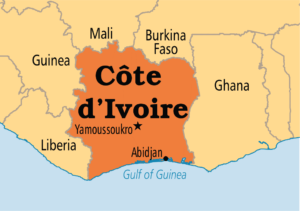READING FROM THE OLD TESTAMENT:
The tragic story of Samson, the twelfth judge of Israel, is a demonstration of repeated unfaithfulness. Samson’s history of unfaithfulness is similar to that which was found in the nation of Israel as a whole. God was faithful to His promise to use Samson according to His own purpose. Even though Samson was unfaithful to God’s Word, God was faithful to preserve Israel for His purpose. Samson was God’s instrument for bringing judgment on the Philistines and deliverance to His people.
Judges chapter 15, verse 11, describes Samson’s way of life. He continually retaliated, seeking revenge.
“As they did to me, so I have done to them.” (15:11)
Samson is surprised to learn that his wife has been given in marriage to his best man by his father-in-law.
 He continues his cycle of revenge by setting the Philistines’ grain fields on fire. He does this by lighting torches, most likely attached to the tails of a pack of jackals, and setting them loose in the fields to set the fields on fire. (The jackal resembles the fox. The same Hebrew word, ‘shu’al,’ is used for both. But foxes do not travel in pairs or packs.)
He continues his cycle of revenge by setting the Philistines’ grain fields on fire. He does this by lighting torches, most likely attached to the tails of a pack of jackals, and setting them loose in the fields to set the fields on fire. (The jackal resembles the fox. The same Hebrew word, ‘shu’al,’ is used for both. But foxes do not travel in pairs or packs.)
 Samson’s wife told the answer to her husband’s riddle in order to avoid the threats from her fellow Philistines to burn down her house. When she betrays her husband’s secret to them, in the end, they burn her house just the same.
Samson’s wife told the answer to her husband’s riddle in order to avoid the threats from her fellow Philistines to burn down her house. When she betrays her husband’s secret to them, in the end, they burn her house just the same.
Samson again takes revenge by striking them “hip and thigh”. We don’t precisely know the meaning of the idiom, but it would seem, in the least, it left his opponents temporarily immobilized. The Philistines explain to the three thousand men of Judah that they sought retaliation in “binding Samson as he did to us.”
Samson is bound by two new ropes which he is easily able to sever as the Spirit of the Lord rushes upon him. Samson takes vengeance and kills a thousand Philistines with the fresh jawbone of a donkey. After accomplishing this feat, he declares his victory with a song, and names the location of his conquest, “the high place of the jawbone.”
Samson is a picture of the self-life with its insatiable thirst for self-gratification and self-vindication. His battles are entirely in the interest of himself. God mercifully gives him the empowerment of the Spirit, yet he publicly sings songs attributing his victory to himself and the jawbone of a donkey.
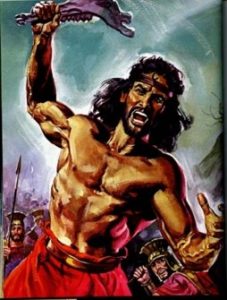 God used Samson as an instrument to begin a process to bring deliverance to the Israelites from their Philistine oppressors. It was not because Samson was any more worthy an instrument than the fresh jawbone of a donkey that was at hand. Samson’s battles with the Philistines were not waged in the interests of the Lord or His covenant people. They were personal feuds with national repercussions.
God used Samson as an instrument to begin a process to bring deliverance to the Israelites from their Philistine oppressors. It was not because Samson was any more worthy an instrument than the fresh jawbone of a donkey that was at hand. Samson’s battles with the Philistines were not waged in the interests of the Lord or His covenant people. They were personal feuds with national repercussions.
God raised up Samson to be a judge over the people of Israel, but the interests of the people are far from his mind. His life is an example of a person, or a people, who squander every opportunity to bring glory to God and serve others.
When Samson is thirsty, he cries out to the LORD for drink. In His mercy, the Lord provides water out of the rock to refresh His unworthy servant. He names the spring “The spring of him who called”. The focus is on his calling upon the Lord rather than the Lord who answered his call!
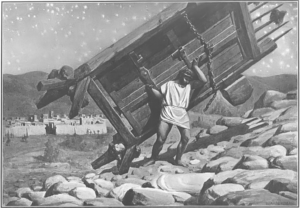 Chapter 16 begins with Samson spending the night with a prostitute. It is a picture of the unfaithfulness of God’s people, breaking the commandments, not fulfilling their vows, and committing spiritual fornication. Yet God provides mercy so that the gates of hell do not prevail. In this incident, when the Philistines in Gaza seek to kill him, Samson escapes and rips loose the very gates of the city, posts, bars, and all, and carries them on his shoulders to the top of the hill across from Hebron.
Chapter 16 begins with Samson spending the night with a prostitute. It is a picture of the unfaithfulness of God’s people, breaking the commandments, not fulfilling their vows, and committing spiritual fornication. Yet God provides mercy so that the gates of hell do not prevail. In this incident, when the Philistines in Gaza seek to kill him, Samson escapes and rips loose the very gates of the city, posts, bars, and all, and carries them on his shoulders to the top of the hill across from Hebron.
The gates of a city were not only there for the city’s protection. The gates were a place where the town officials met for business and legal transactions. To “possess the gates of the enemy” was a metaphor indicating the enemy’s defeat.
Samson falls in love with Delilah. Although it is not specifically stated that she was a Philistine, it is very likely, as she is in a close relationship with Philistine leaders. Some scholars believe that she may have been a temple prostitute.
The Philistine leaders offer Delilah money if she can gain the secret to his great strength. She complies and seeks to entice Samson to disclose his secret. Samson seeks to fool her by claiming that he will be weakened if bound by 7 fresh cords. She binds him with 7 cords, and he easily snaps himself free.
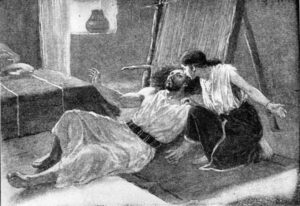 The ruse continues as Delilah seeks to uncover the secret to Samson’s strength. He declares that he would be weakened if the seven locks of his hair were woven and fastened to a loom with a webbed pin. She believes him and fastens his woven hair while he is asleep. When she awakens him with the warning that the Philistines are upon him, Samson easily frees himself from the loom and the web.
The ruse continues as Delilah seeks to uncover the secret to Samson’s strength. He declares that he would be weakened if the seven locks of his hair were woven and fastened to a loom with a webbed pin. She believes him and fastens his woven hair while he is asleep. When she awakens him with the warning that the Philistines are upon him, Samson easily frees himself from the loom and the web.
Delilah complains that she is unloved by Samson because he is withholding his secret from her. He then discloses that his secret is in the Nazirite vow to God, a covenant relationship made while he was yet unborn. The symbol of that was his unshaven hair.
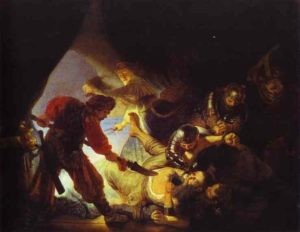 With this secret now in her possession, she sells it to the Philistine leaders who bring her the promised sum. While he is asleep, she calls in a man to shave off the seven locks of his hair.
With this secret now in her possession, she sells it to the Philistine leaders who bring her the promised sum. While he is asleep, she calls in a man to shave off the seven locks of his hair.
The sad reality is “He did not realize the Lord had left him” (Judges 16:20).
Void of the Lord’s strength, Samson is overpowered by the enemy, and his eyes are gouged out. He is taken as a prisoner to grind grain in the prison at Gaza.
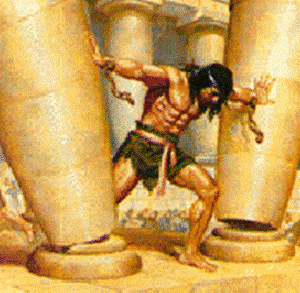 The final victory of Samson is one that is accomplished when he is blind, bound, and a slave to the Philistines, who are ridiculing him, and praising their god, Dagon, for giving them victory over Samson.
The final victory of Samson is one that is accomplished when he is blind, bound, and a slave to the Philistines, who are ridiculing him, and praising their god, Dagon, for giving them victory over Samson.
Samson quietly asks the young servant who is bringing him out for the people’s amusement to put his hands against the temple pillars so he can rest.
Samson prays to the LORD, “Sovereign God, remember me again.” He asks for strength to be able to take revenge on the Philistines for the loss of his eyes. He prays that he be allowed to die with the Philistines. God strengthens Samson, and he is able to bring down the temple of Dagon on the Philistines and on himself.
Samson destroyed more Philistines when he died than he did during his entire lifetime.
People ask why Samson, who was so unfaithful, is listed in the New Testament Book of Hebrews as one who demonstrated faith (Hebrews 11:32). Samson was not a ‘faith hero’ although it is God who gave him his promise and his power. The One who brought deliverance for his people was the Lord. Hebrews 11 lists people who believed God to various extents and engaged in events that would ultimately reveal His purpose that would be fulfilled in and through Jesus Christ. He is the Greater and Truer Abel, whose blood was shed. He is the greater Noah who provided salvation for His family. And like Samson, He defeated the enemy by His death.
Hebrews 12:1-3 1 Therefore, since we have so great a cloud of witnesses (the examples of people in Hebrews 11) surrounding us, let us also lay aside every encumbrance and the sin which so easily entangles us, and let us run with endurance the race that is set before us, 2 fixing our eyes on Jesus, the author and perfecter of faith, who for the joy set before Him endured the cross, despising the shame, and has sat down at the right hand of the throne of God. 3 For consider Him who has endured such hostility by sinners against Himself, so that you will not grow weary and lose heart.
READING FROM THE NEW TESTAMENT
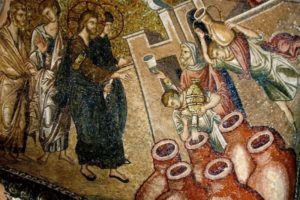 John gives us eight sign-events that point to the deity of Christ. Seven are before the resurrection, and one is after. They are introduced in the context of a variety of God-given human needs and experiences.
John gives us eight sign-events that point to the deity of Christ. Seven are before the resurrection, and one is after. They are introduced in the context of a variety of God-given human needs and experiences.
The first sign that John puts before his readers is the Miracle at Cana, in which the water is turned to wine. It is a situation of outward joy- a wedding celebration. We do not know the name of the couple. We only know that Jesus, his mother, and his disciples were invited and attended the feast.
What is in view here is the human need for relationship. “It is not good that man should be alone” (Genesis 2:18). The exemplary human relationship is the covenant relationship of marriage. So, the first sign that John records takes place in the context of a marriage and a marriage feast. This brings to mind the relationship initiated in the Garden of Eden with Adam and his wife (Genesis 2) and described in the last book of the Bible, also authored by John, the marriage supper of the Lamb (Revelation 19). The coming of Christ into the world is to ultimately obtain a bride (the church).
John notes that the wedding takes place on the third day. He is referring to the third day after Jesus’ encounter with Nathaniel, but it brings to mind an expositional constant in the Bible that culminates with Jesus’ resurrection on the third day. In the Book of Genesis, the earth emerges from its watery grave on the third day (Gen 1:9,11). In Hosea 6:2, we read, “He will revive us after two days; He will raise us up on the third day, that we may live before Him.”
This is what redemption has in view: our emerging from the grave to live together with God by the power of resurrection in a covenant relationship with Christ.
There is an example of human failure and lack at the wedding. The verdict is- They have no wine. Wine speaks of that which brings joy and pleasure both to God and man (Psalm 104:15; Judges 9:13).
Mary, the mother of Jesus, is aware that the situation threatens to cause social embarrassment. She tells Jesus what He must have already known: “They have no wine.”
Jesus responds to his mother informing him of the lack of wine at the covenant celebration with the words: “Woman, what does this have to do with me? My hour is not yet come.”
We might think about Jesus’ question and ask, “What does this event have to do with Jesus?”
“The hour” he speaks of is the hour for which he has come. He has not come to do miracles, although miracles He will do. He has not come to save us from social embarrassment, He has come to ransom us from death by shedding His blood. He has come to yield His life as an atonement for sin, as the only Savior for mankind. He has come for the hour of His crucifixion, in which His death, burial and resurrection would bring the reconciliation of lost sinners back into a covenant relationship with God. There are seven references to His hour in this Gospel: John 2:4, 7:30; 8:20; 12:23, 27; 13:1; 17:1.
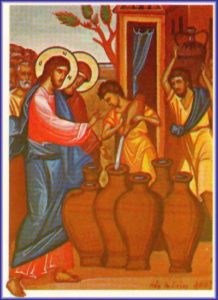 There are six stone water jars present. Six represents the number for our humanity. Man was created on the sixth day. Jesus hung on the cross for six hours. Six falls short of seven, the number and word that speaks of perfect sufficiency. The human being was a vessel made by God for His purpose. Through sin, he falls short of God’s perfection. The condition of the vessel after the Fall is that it is one of stone- the heart of man in itself is unable to respond to the will of God (Ezekiel 36:26) and he is empty of that which brings pleasure to God.
There are six stone water jars present. Six represents the number for our humanity. Man was created on the sixth day. Jesus hung on the cross for six hours. Six falls short of seven, the number and word that speaks of perfect sufficiency. The human being was a vessel made by God for His purpose. Through sin, he falls short of God’s perfection. The condition of the vessel after the Fall is that it is one of stone- the heart of man in itself is unable to respond to the will of God (Ezekiel 36:26) and he is empty of that which brings pleasure to God.
Jesus does not call Mary by name, nor does he call her ‘mother’, which would infer his natural relationship with her. Instead, he addresses her, saying, “Woman.” It was the Creator speaking to His creation; the Redeemer speaking to one who needed to be redeemed. His obedience was to be to His heavenly father. What He was about to do was not going to be done merely as a personal favor to his mother or to help wedding hosts save face. It would be a sign reflecting His office as Redeemer and anticipating His role as humanity’s heavenly bridegroom.
Mary says to the servants, “Do whatever He tells you” (John 2:5). She recognizes His authority and wisdom. She knows it is His Word, not hers, that will bring salvation.
The servants are told to fill the jars with water. Water is used for cleansing and refreshing. The water speaks of His Word by which we are washed and cleansed (John 15:3; Ephesians 5:26). Later in the Gospel of John, we see water as a symbol of His eternal life mediated to us by the Holy Spirit (John 7:38-39).
Jesus is not just a wedding guest. He is the Lord of the wedding, the Lord of the Feast, the Lord of Life. The servants obey the words of the Lord Jesus and fill the six huge jars to their brims with water. They then obey His command to draw some out and bring it to the master of the feast.
This is an act that requires that the servants walk by faith and not by sight (2 Cor 5:7). The master of the feast, the wedding coordinator, tastes what the servants draw out. Unbeknownst to him, the water has become wine. Not just good wine. It is better than the fruit of the natural vine. It is from the True Vine- Christ. It is the best of the best.
The master’s verdict heralds the New covenant of God’s grace:
John 2:10 (NASB) 10 and (he) said to him, “Every man serves the good wine first, and when the people have drunk freely, then he serves the poorer wine; but you have kept the good wine until now.”
John comments that this was a sign that showed forth the glory of Christ. He turns the water into wine, that which brings joy to God and man.
Is your heart satisfied? Has your joy run out? The fruit of the old vine fails. Israel was a false vine. Religion is a false vine. Self-justification is a dead vine. The best that this world offers is not sufficient to bring pleasure to God and true satisfaction to the heart of man. We need Jesus, the Lord of the wedding, the Redeemer, the Heavenly Bridegroom, the true Master of the Feast, the True Vine, to bring salvation. Hear His Word and obey, and your water will be turned to a wine that satisfies.
Jesus clears the temple in verses 13-20. John records the profound prophecy that Jesus makes at the time: “Destroy this temple, and in three days I will raise it up!”
Of course, His hearers think He is referring to Herod’s Temple, which took 46 years to build. But John explains that Jesus was speaking of His body and predicting His resurrection on the third day after His death by crucifixion.
John makes it clear that Jesus’ commitment was not to men but to the Father for all that He was committed to doing through Him for others.
The New Living Translation makes it clear: “But Jesus did not trust them (those who were beginning to trust Him) because He knew human nature. No one needed to tell him what mankind is really like” (John 2:24-25).
TODAY’S READING FROM THE BOOK OF PSALMS
PSALM 103:1-12
Psalm 103 verses 1 and 2 are the middle verses in the entire Bible.
There are 31,102 verses in the Bible (KJV). Since the count is an even number, there is no single middle verse of the Bible are the two middle verses of the Bible, with 15,550 verses before them and 15,550 verses after them.
Bless the LORD, O my soul, and all that is within me, bless his holy name! 2 Bless the LORD, O my soul, and forget not all his benefits,
What a great Psalm of praise this is. David gives heartfelt praise for how he has benefitted from God’s mercies. David sings of all he has received and all that he can look forward to- the forgiveness of all his sins, the healing of all his diseases, redemption from death, to be crowned with love and tender mercies. He writes of how the Lord is filling his life with good things, renewing his youth, causing him to soar as an eagle, giving him a right standing with God, justice to all treated unfairly.
God treats us as “in Christ” ones. His compassion takes into consideration our pitiful state (v. 13-18). He treats us as a father who tenderly cares for his children, from generation to generation.
In Christ, we have a greater picture of God’s character than that which was given through the law of Moses. He has given us the New Covenant! His anger is turned away. We have grace and mercy. Someone has said that grace is getting what we don’t deserve, and mercy is not getting what we do deserve!
The Psalm culminates in an exultant chorus of praise:
Psalm 103:19-22 (NASB) 19 The LORD has established His throne in the heavens, and His sovereignty rules over all. 20 Bless the LORD, you His angels, mighty in strength, who perform His word, obeying the voice of His word! 21 Bless the LORD, all you His hosts, you who serve Him, doing His will. 22 Bless the LORD, all you works of His, in all places of His dominion; Bless the LORD, O my soul!
PROVERB FOR TODAY- Watch your temper, your gullibility, and persevere in seeking first the kingdom of God and His righteousness!
Proverbs 14:17-19 (NASB) 17 A quick-tempered man acts foolishly, and a man of evil devices is hated. 18 The naive inherit foolishness, but the sensible are crowned with knowledge. 19 The evil will bow down before the good, And the wicked at the gates of the righteous.
Although the Proverbs are maxims for this life, we can’t help but think about the eternal reality in the Judgment to come when the evil will bow down before the good.
PRAY FOR THE NATIONS
(from the recommended Prayer Guide “OPERATION WORLD”) www.operationworld.org
Republic of Côte d’Ivoire
Africa
Area: 322,463 sq. km
On the west African coast between Ghana and Liberia. Rainforest in the south and savannah/highlands in the north.
Population: 21,570,746 Annual Growth: 2.31%
Capital: Yamoussoukro
Urbanites: 50.1%
HDI Rank: 163 of 182 (UN Human Development Reports 2009)
Official language: French, used by a high proportion of the population. Jula is the most widespread indigenous language, used as a trade language in the north and Abidjan. Languages: 93
Religion
Largest Religion: Muslim
|
Religion |
|
Pop % |
Ann Gr |
|
7,256,399 |
33.64 |
2.9 |
|
|
2,256,431 |
10.5 |
3.0 |
|
|
Muslim |
9,016,572 |
41.80 |
|
Answer to Prayer
There is a measure of stability after two recent civil wars and uneasy ceasefires. While all the issues that generated the troubles are not resolved, the return of stability to the country is a point for praise, since economic activity, education, development and rebuilding can now resume- and since the north is once again much more accessible for Christian ministry.
Continued growth in evangelical circles. In Abidjan alone, there are probably more than 3,000 churches, most of them relatively new and independent.
The further consolidation of Christian unity- This comes in large part through the work of Transformation Africa/Global Day of prayer, through Radio Fréquence Vie, (the only national Protestant radio station), and through the work of interdenominational ministries such as The Bible Society, CCCI and GBU.IFES, the Christian publisher CPE, SIM’S Pastors’ Book Set Project and Africa Bible Commentary.
Challenge for Prayer
The country has been essentially divided between the Muslim north and multi-faith but predominantly Christian south. Although peace is established and the nation is moving forward, the loss of life, of infrastructure and of confidence in Côte d’Ivoire’s fundamental unity will leave scars on the nation’s psyche. Pray for political leaders who are visionary, non-partisan, free of corruption and able to boldly take the nation forward and past this unfortunate episode in Côte d’Ivoire’s history. Pray also for a satisfactory solution to the remaining challenge- how to handle the millions of immigrants from neighboring countries, a problem at the core of the conflict of 2002-2007.
The Catholic Church has made a deep impact through an extensive educational system. Catholics are a large minority in the south and among the upper and middle classes as a result. Nominalism is common in the Catholic and Methodist denominations, two of the country’s largest. But there are significant numbers of genuine believers in both as well as a vibrant charismatic movement.
Animism is still strong in Côte d’Ivoire, despite apparent numerical decline. Although evangelical congregations outnumber sacred fetish groves for the first time in the nation’s history, animism’s power remains unbroken and penetrates deep into the worldview and practices of both Christians and Muslims. Many believers are affected by the power of African traditional religion, especially through fetish charms and ancestor worship, compromising both their witness and their own life in Christ. Pray that all who have not fully left behind this past might be delivered by the power of Jesus. Pray that believers might withstand temptation to revert to old practices of animism.
PRAYER: Lord, we are so grateful for the many demonstrations of Your mercy. The greatest display of Your mercy is in the gift of Your Son and His self-giving sacrifice on the cross. We thank You for all that He accomplished on our behalf in order that we might have a covenant relationship with You for all eternity. We praise You for our Heavenly Bridegroom and we ask that nothing would impede the ministry of His life in us today. May Your Holy Spirit flow through us, empower us and may Your love be seen in us. In Jesus’ Name. Amen.
Pastor David
So, naturally, we proclaim Christ! We warn everyone we meet, and we teach everyone we can, all that we know about him, so that, if possible, we may bring every man up to his full maturity in Christ. (Colossians 1:28, J.B. Phillips paraphrase)
New Life Community Church, Concord, MA 10742
www.newlife.org

